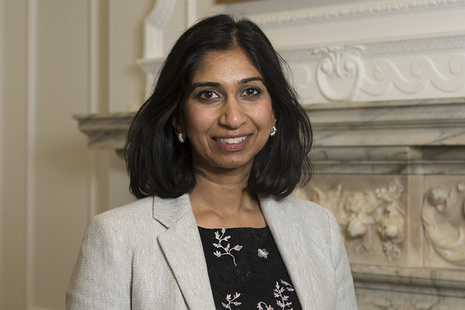
Home Secretary Suella Braverman has called upon police leaders to intensify the use of stop-and-search powers as a means to prevent knife attacks and save lives. In a message directed to all
43 forces in England and Wales, Braverman emphasized the need to eradicate the "dangerous culture" of carrying weapons.
Braverman also urged police forces to promptly release body camera footage to counteract the phenomenon of "trial by social media" faced by law enforcement officials.
Critics of stop-and-search argue that it disproportionately targets individuals from ethnic minorities. Under current laws in England and Wales, police can conduct stop-and-search on individuals or vehicles if they possess "reasonable grounds" to suspect the presence of weapons, drugs, stolen property, or objects that may be used in the commission of a crime. Detractors argue that this practice can leave people feeling victimized and perpetuates discrimination.
However, the government defends stop-and-search as a sensible policing tactic, and the Metropolitan Police has deemed it a vital power for safeguarding the public. According to recent data, more than 100,000 weapons have been removed from the streets of Britain since 2019, with nearly half of them seized during stop-and-search operations, leading to over 220,000 arrests.
In her press release to police forces, Braverman asserted, "My first priority is to keep the public safe, and individuals who choose to carry weapons must understand that there will be consequences. The police have my full support to increase the use of stop-and-search whenever necessary to prevent violence and save more lives."
Stop and search powers have been a subject of controversy due to statistics indicating that black individuals are seven times more likely to be subjected to such searches compared to their white counterparts. Campaign groups have cautioned against relaxing restrictions on the use of this power, fearing it could exacerbate discrimination.
The Home Office acknowledges the disproportionate impact of knife crime on black males and has called for concerted efforts to address the issue. The department is also planning to enshrine two conditions for the use of stop-and-search powers into law. It advocates for police to communicate with the local community when implementing Section 60 orders, which allow for stop-and-searches without requiring "reasonable grounds." Additionally, the Home Office emphasizes the need for continued data collection on all stop-and-search interactions for transparency and public scrutiny.
While the National Police Chiefs' Council regards stop and search as a valuable policing tool, former Metropolitan Police Chief Superintendent Dal Babu finds Braverman's intervention troubling, suggesting that local commanders should retain discretion in deciding when to employ this tactic. Emmanuelle Andrews, the policy and campaigns manager at Liberty, criticizes the home secretary's push, believing it will cause immense harm to communities.
The policing watchdog has previously called for an end to the disproportionate use of stop-and-search on individuals from black and other ethnic minority backgrounds. In 2022, the Independent Office for Police Conduct acknowledged the legitimacy of stop-and-search as a policing tactic but stressed the need to break the cycle of its discriminatory use, which causes trauma and erodes confidence in policing. Photo by UK Government, Wikimedia commons.


































